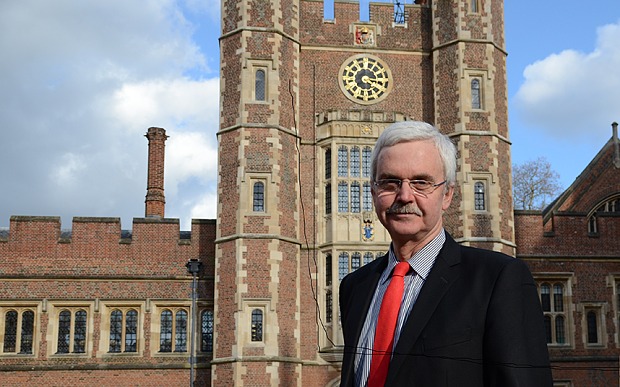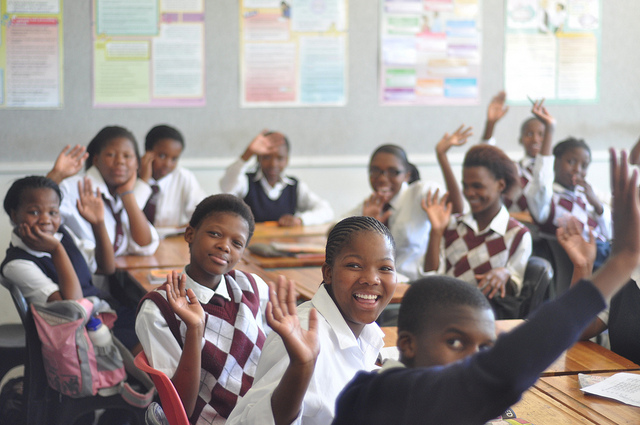The future of education: fewer exams and more ‘assassins’
Are today’s students over-schooled and under-educated? Former Eton Head Master Tony Little discusses the crisis in Britain’s education system, his stance on GCSEs and his love of career changers.
By Helena Pozniak, October 2015
 Tony Little, former Head Master of Eton College, doesn’t exactly miss his job, but he does miss his pupils. “All human life passes here when you are head,” he says. “Being around young people, their aspirations, quirkiness and vitality – it’s a compelling place. There are very few areas of professional activity where you have that tonic.”
Tony Little, former Head Master of Eton College, doesn’t exactly miss his job, but he does miss his pupils. “All human life passes here when you are head,” he says. “Being around young people, their aspirations, quirkiness and vitality – it’s a compelling place. There are very few areas of professional activity where you have that tonic.”
After a career at the helm of British boarding schools, including 12 years at England’s most famous boys’ school, he’s written what he deems to be a “little book” aimed at parents. An Intelligent Person’s Guide to Education is his plea to parents to get to grips with what education should be about. He loathes educational jargon, doesn’t much like GCSEs and thinks some parents should wise up about what their adolescents are up to.
“Don’t get me wrong, I’m no iconoclast,” he says. In fact he wholeheartedly supports testing teenagers in core skills of maths and English, and values educational rigour. But he believes that sitting 16-year-olds down at a desk in silence for formal exams in some 11 subjects is absurd. “This is a very specific, traditional type of exam we are obsessed with. The whole exam measurement business has got out of hand.”
So is there a crisis brewing in Britain’s schools? At the heart of Little’s argument is that when a school becomes fixated on testing, it affects how teachers teach, and how pupils perform. “Worrying about statistics and grades pulls everything out of kilter,” he says. “It distracts from the education of the ‘whole child’.” When he was head of Eton, Little insisted upon leaving his door open – literally – so any pupils could drop in before the start of the school day, to chat about anything. “After a while, a handful of boys would pop in every morning,” he says. And one of the benefits of boarding school means that pupils don’t just see the head as a distant “suit”. He’d be in sports kit on the touchlines, or in casual clothes at an evening play or talk. “It sounds ridiculous to talk about clothing but it’s terribly important that students see you as a human being.”

Boarding-school education is an unsung national treasure, he believes, and as current head of the Boarding Schools’ Association in its 50th anniversary year, he plans to raise the profile of “some fantastic state boarding schools in the UK”. And while he worries about current education trends, he certainly doesn’t extend this criticism to teachers themselves, though he has a thing or two to say about their training. This, he believes, risks taking the soul out of the profession. “In my time I’ve witnessed possibly the best generation of young people come into teaching,” he says. “Really motivated. Levels of professional competence are higher than ever. But, but, but…”
He recalls his first day of teaching. During the coffee break, an old hand sauntered up to him in the staff room and told him that good teachers were born, not made, and he should shape up or ship out. “With that, he turned on his heels and left,” Little recalls. “That was my induction, that’s the way it was.” While he’s certainly not recommending a return to this Seventies’ style “learning by osmosis”, he’s also not a fan of modern orthodoxy which he believes has turned teaching into a painting-by-numbers exercise. “Old school teachers were probably nothing like as competent in the classroom as current professionals. But a lot of them had a real vision of what they were about – we don’t want to lose sight of the stronger vocational element. Teachers need to be openly human, if that doesn’t sound too daft.”
When hiring new staff, he had three categories. Those who wanted a job and (“I tried pretty hard not to appoint them”); those who saw themselves as competent professionals (“You need a significant number of these people on your staff”) and a third group. “These people saw teaching as their vocation, they don’t need to be told to go the extra mile. They wouldn’t think twice about staying an hour after school to help out one child who was having problems.”
But however charismatic or effective a teacher is, at a certain age adolescents learn more from their peers than adults, Little believes, and more outside the classroom than within it – and it falls to schools to help this happen in imaginative ways. He saw this first hand when the head of a tough comprehensive in Slough approached him to help pupils who spoke a “huge number of different first languages”. Eton trained 65 of its lower-sixth students, who went on to mentor the state pupils.He’s a big fan of career changers; some of his best staff were refugees from the legal professions, even a trader from Schroders who, Little recalls, was “a great communicator”. Part of the fun, he remembers for pupils, was creating a mythology around their teachers. And so a 6ft Roman Catholic chaplain at Eton was rumoured to be an SAS assassin. “That was hard to imagine but it raised his street cred no end,” he says.
“Results were dramatic; there was a massive upswing in achievement. The head was right. There’s something about having someone work with you, and also talk about Arsenal, or whatever.”

But with what authority does Little speak about national education, when he’s spent his career in private boarding schools, went to Eton on a choral scholarship, and on to study English at the University of Cambridge? Well he doesn’t profess to have any (“I’m an interested bystander”), but he does have an impressive track record. He’s been a governor at three state schools, has helped set up a free school in Berkshire and he’s a trustee of an educational charity. He knows the value of reading and urges parents to spend hours doing this with their own children – his own daughter went to school already knowing how to read. “We know life chances are very firmly directed by the age of five,” he says.
His book contains a chapter on parenting – in response to years of questions from parents, who at Eton might have been particularly hard work. Most adolescents will be exposed to situations where drugs are about, he says, and many at that age will “do something daft – it’s part of life”. He says that he still finds a lot of parents are in denial. “They think, ‘That would never happen to my child’.” His fundamental advice is familiar – keep talking to your teenager – but he includes tips for despairing parents on how to make that happen. Car journeys with no eye contact but the intimacy of space are particularly good, for instance.
He’s also compiled a reading list: books that “every bright 16-year-old should read” – a response to what he considers the confines of the English literature curriculum for 16-year-olds. “I mean Of Mice and Men is a great novel but it’s not the only book.” He hasn’t quite read everything on his list, which includes fiction by Kazuo Ishiguro and Ian McEwan as well as works on science, religion and art – but he’s delighted it’s stirred debate. Keeping teenagers reading is his aim, be it comics, websites or magazines.
He’s said in the past that “character” can be taught, which he says is a “bald” version of what he means. Having a range of role models outside the home is crucial. So are learning to ask questions, make judgments and work out right and wrong. “The real point to education is this: school is a place outside home where young people learn how to navigate adult life effectively, with purpose and compassion. To me that’s kind of it. Everything else is a means to an end.”
Images: student_ipad_school - 138 by Brad Flickinger (via Flickr)
Kayamandi High School by Megan Trace (via Flickr)
